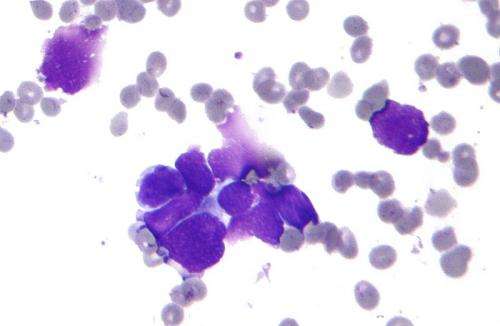Nivolumab for the adjuvant treatment of esophageal carcinoma: Indication of minor added benefit

In an early benefit assessment, the German Institute for Quality and Efficiency in Health Care (IQWiG) investigated whether nivolumab has an added benefit over watchful waiting in the adjuvant treatment of adults with carcinoma of the esophagus or the gastroesophageal junction and pathological residual disease after prior neoadjuvant chemoradiotherapy (CRT).
Those affected develop less recurrences than under the appropriate comparator therapy. Three negative effects in other outcomes do not completely outweigh this positive effect. At the same time, the data presented are incomplete: The effect on overall survival cannot be assessed. Overall, there remains an indication of a minor added benefit of nivolumab versus the appropriate comparator therapy.
Approved for the first time for the adjuvant treatment of esophageal cancer
Nivolumab is a monoclonal antibody that binds to a receptor on the T-cells and stimulates the immune system by suppressing an inhibitory effect. The drug is approved for the treatment of various cancers, including melanoma, renal cell carcinoma, urothelial carcinoma, non-small cell lung carcinoma, Hodgkin's lymphoma and esophageal carcinoma.
Now, for the first time, nivolumab has also been approved for the adjuvant treatment of adults with carcinoma of the esophagus or gastroesophageal junction who have pathological residual disease after prior CRT. This made another early benefit assessment necessary.
Study compares nivolumab with placebo
The manufacturer's dossier is based on an ongoing, double-blind randomized controlled trial on adults with stage II or III carcinoma of the esophagus or gastroesophageal junction at initial diagnosis that compared nivolumab with placebo—a sufficient approximation to the appropriate comparator therapy "watchful waiting" as defined by the Federal Joint Committee (G-BA). The primary outcome was disease-free survival. The dossier contains results of a first data cut-off for the outcomes on health status, health-related quality of life and side effects, as well as results of a second data cut-off for disease-free survival and the recurrence rate.
No data on overall survival
Data on overall survival are lacking although they are particularly significant in the present oncological indication. According to the manufacturer, the data were still too "immature" at the first data cut-off. "However, that is no reason not to present these data" says Thomas Kaiser, Head of IQWiG's Drug Assessment Department. "And it does not explain why he does not provide any data on overall survival for the second data cut-off either. This approach is not appropriate".
However, since currently nothing suggests that nivolumab performs worse in overall survival than watchful waiting, an added benefit can in principle be derived from the data on the other outcomes of the study. However, the extent of this added benefit is downgraded due to the uncertainty on overall survival.
Advantage in recurrences, disadvantages in side effects
In several outcomes from the categories "morbidity", "health-related quality of life" and "side effects", there are not hints of advantages or disadvantages of nivolumab versus the appropriate comparator therapy.
For the outcome "recurrence" (operationalized as recurrence rate and disease-free survival), however, there is a clear advantage of nivolumab compared to placebo. This results in an indication of a considerable added benefit. This is contrasted with three negative effects in outcomes from the side effects category: "treatment discontinuation due to side effects", "infections and infestations" and "blood and lymphatic system disorders". However, these negative effects do not completely challenge the positive effect for the outcome "recurrence".
In the overall consideration, this results in an indication of a minor added benefit of nivolumab versus the ACT "watchful waiting" for adult patients with carcinoma of the esophagus or gastroesophageal junction with pathological residual disease after prior neoadjuvant CRT.
G‑BA decides on the extent of added benefit
The dossier assessment is part of the early benefit assessment according to the Act on the Reform of the Market for Medicinal Products (AMNOG) supervised by the G-BA. After publication of the dossier assessment, the G-BA conducts a commenting procedure and makes a final decision on the extent of the added benefit.
More information: Assessment (in German): www.g-ba.de/bewertungsverfahre … nutzenbewertung/728/

















